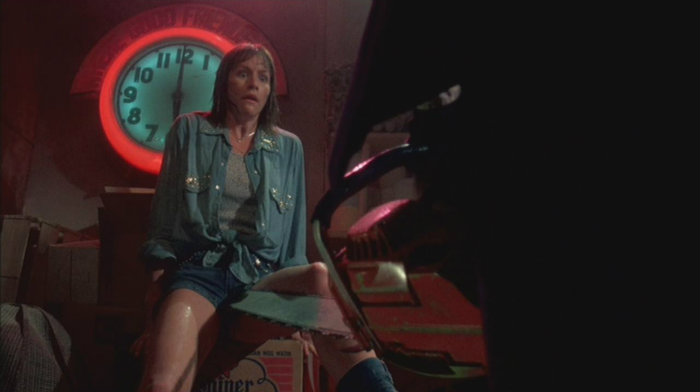
So, you’ve Taken to Facebook and Twitter to promote your web site and they’ve melted your brain??
Like an ice cream sandwich forgotten in Jonah Hill’s back pocket. One thing I see somewhat regularly is people talking about how women are always victims in movies, especially women in horror movies, as though the sole reason for this is misogyny. We watch horror films to see women murdered because we hate them so intensely. It’s not just social justice warrior types who say this. It is a casual assumption many of us make. I’ve probably lazily tossed out this pearl of common wisdom on this site somewhere.
So, who cares?
Well, I thought about it some and it’s an interesting subject. I mean, we take it for granted that our behavior is reasonable, but how odd is it that a bunch of bald monkeys like to pass their lives away staring at other monkeys pretending to do things on a screen? Why do most of us watch a knife wielding monkey chase a girl monkey across those screens at least 100 times over the course of our lives? It’s obviously very compelling to us. So, I thought of three primary reasons we like to watch girls chased around by maniacs.
One: The girl represents life in the confrontation between life and death and her sexuality reminds us that life, sex and death are intertwined.
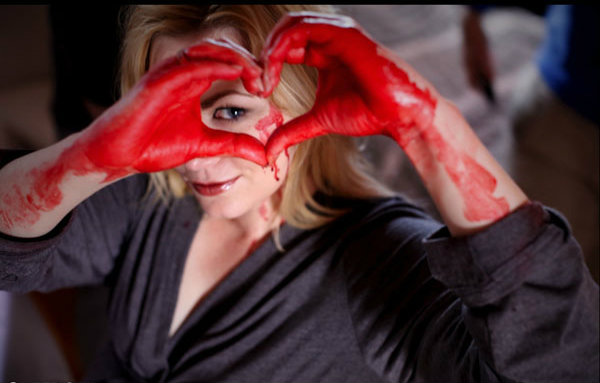
So, let’s start with the basic level. I don’t think many people just want to see women stabbed to death because they hate them. Maybe a little bit, but that’s not what really drives all this. At the same time, straight men spend a lot of time pursuing women in hopes of penetrating them in a less objectionable fashion. Of course, when the villain in a horror film gets the girl, she shrieks and screams, and when you penetrate a girl in real life she just says, is it in? and are you finished yet? Killing someone and getting a woman pregnant are probably the two most dramatic things you can do to someone else’s body. There’s definitely a common theme of pursuit and conquest, driven by different but related types of lust.
It’s a fine and often crossed line between pleasure and pain. Sex and death can both bring ooze, squirming, noise and stink. The world of horror has many images of women drenched in blood, some of which are meant to be sexy. And all of this is related to water as a traditional symbol of fecundity. When it comes to sex, we drop our robotic aspirations of transcendent cleanness and efficiency and throw ourselves back into the swamp of the animal reproductive process. A swamp in which women will always be more deeply mired than men.
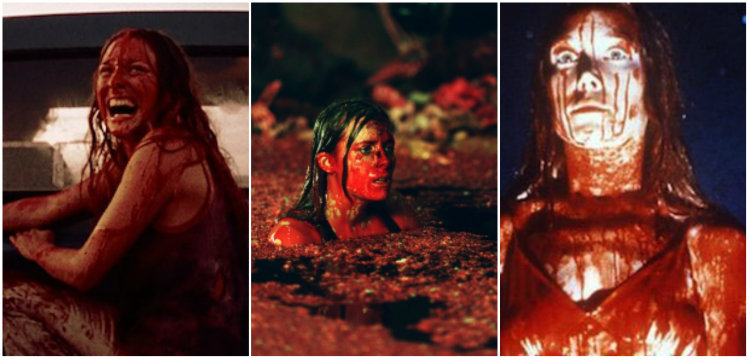
Misogyny-gotcha!
Only if you believe I’m the one who decided women would be the ones stuck lactating, menstruating, carrying fetuses and giving birth. Granted, I am glad they got stuck with all that stuff instead of us. But these are some of the reasons we idealize women, rather than reasons we hate them. This is all tied together in the animal side of our existence.
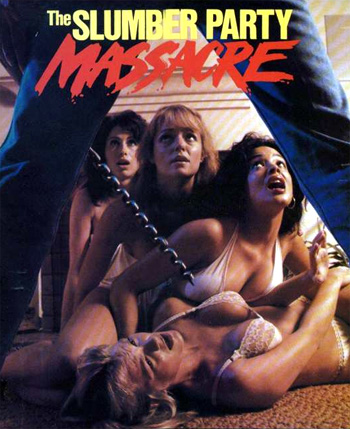
So, back to stabbing teenage girls with big knives…
Well, of course, sex itself is an expression of your mortality. You are driven to reproduce because it’s the only way for your genes to carry on, given that you are going to die. Every time you have sex, or are even attracted to someone, you indirectly acknowledge your eventual death. Perhaps somewhere in this stew is the fact that some women die during childbirth, so sex can equal death even more directly. Horror films tend to emphasize these connections between sex and death by doing things like having big strong men with giant knives chase pretty young girls.
The typical horror heroine/victim is at the most dramatic point of advancing through the cycle of her life. She is in her teens or early 20s. She’s moved from childhood to sexual maturity. She can now become a mother, at which point she enters proper adulthood. And becoming a parent moves us down a good way on the conveyer belt to the grave. Our children become more important than ourselves. The value of our lives fades. Our most important job is tending to our replacements. Other than that, we might as well be dead. We’re most valuable at our ripest, but also on the cusp of starting to rot.
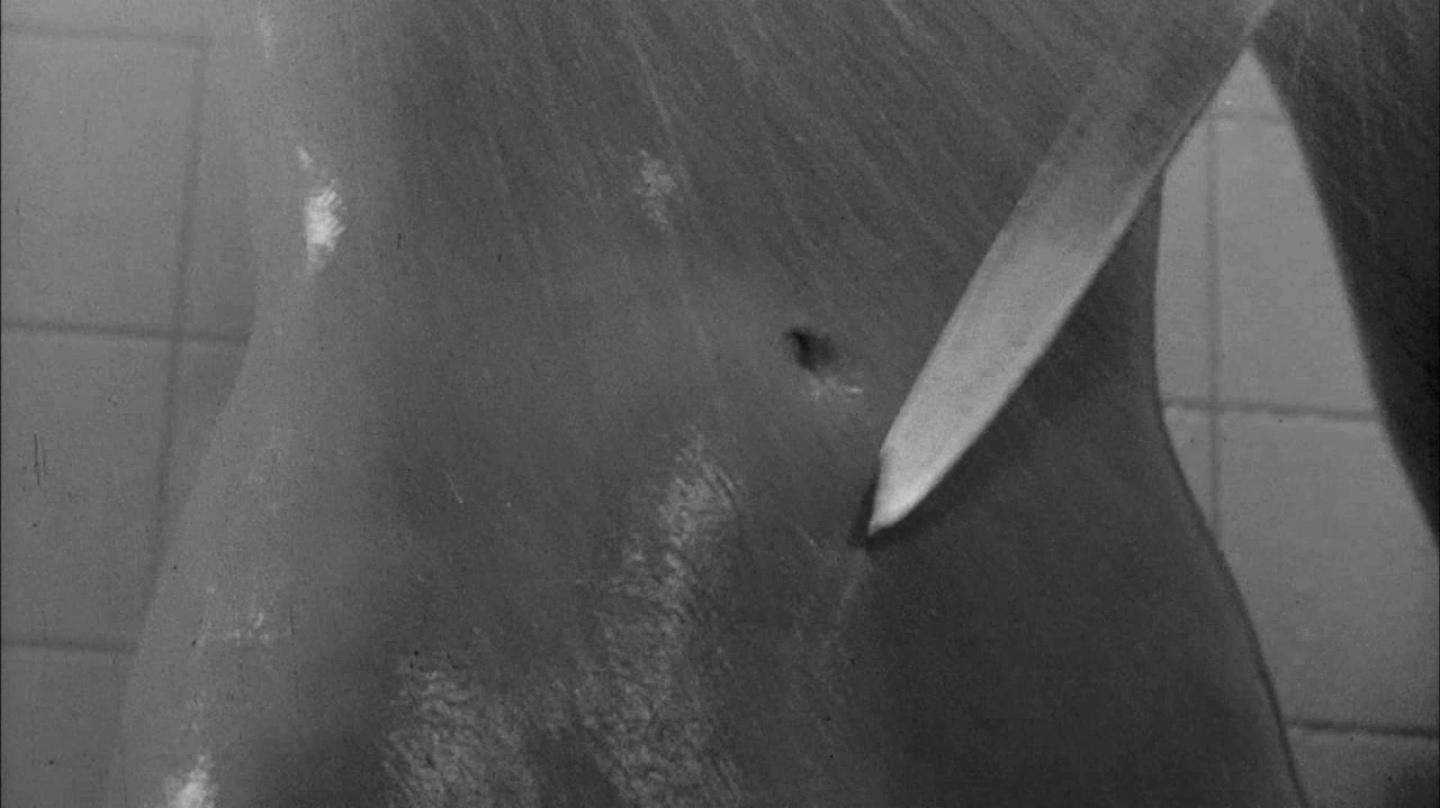
What about birth control? Women’s lib? Consequence-free hook ups? Blahblahblah?
Obviously, horror films operate on a more visceral level than that. Your objections are like saying, why don’t they just call the police?? or why are they splitting up instead of staying in a group? or don’t go in the basement!? When we’re seventeen we say we don’t want to get married or have kids and that we hope we die before we get old (i.e. turn thirty). Later, we try to believe that we have elevated ourselves above the primal aspects of our existence, or at least harnessed them in service to our elevated consciousness. Just like the characters resolve to stay in a group at the beginning of the film. But nonetheless, we are compelled to break off from the group and venture into the basement, just as we advance through the cycle of life. It’s all inevitable. That’s the horror.
So, what does all this sex and violence add up to?
It isn’t a simple message. There is something vaguely erotic about it all, but we are really being exposed to the darkest realities of our existence. Even a beautiful young girl, a fountain of life, is at the epicenter of death. Maybe we are being reminded that death lurks under even the most vital, exciting and beautiful aspects of our existence and the horror movie brings this from the distant background of our consciousness and into the forefront.
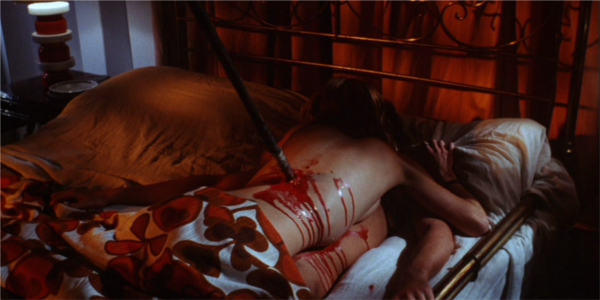
Are people being punished for having sex?
I think that can be part of it, but that explanation has never really sat well with me. It’s not that simple. Part of it is just all the mingling of sex and death described above. Once you show someone having sex, you pretty much have to kill them. Sex and death: you can’t have one without the… o-ther!
These scenes aren’t just about punishment, they are about the inescapable horror of our existence. Even a teenage fling, purportedly a high point of our lives, is a fleeting distraction, itself laced with danger and death.
But the virginal heroine escapes. Shes not always an actual virgin, but y’know.
Agreed. Yes, she’s rewarded for being a virgin, but let’s figure out why she is rewarded for being a virgin. Also, I think she has to be spared so we can end the story with a satisfying lie.
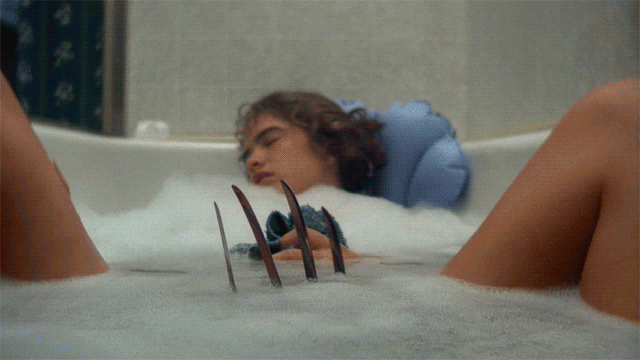
You tell me why the virgin is rewarded, Pauline Kael.
We mostly stroll around in denial of the bleaker facts of our existence. The horror movie allows us to take a break from that denial and confront the darkness, but from a position of detachment, as we watch it inflicted on other people. We acknowledge the horror, and relax our denial, but in a way that is removed from ourselves.
After we delve into that experience, we need to be snapped out of it, as if being removed from a hypnotic trance. The girl is alive. Preserved in the flower of youth. Her virginity isn’t merely an expression of moral purity. It means her life is still about potentiality, rather than decline. She’s done something to fight off an inescapable, undefeatable monster akin to death itself. Her decisions, her agency, have saved her. Life triumphs. She has found a way out and maybe we can too.
Two: Women are precious and vulnerable, so we’re more afraid for them.?
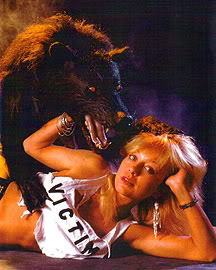
Women and children first!
Indeed. It always has been that way and it always will be that way. If you want to make a bunch more people, you need a lot of women and only a few men. So, men can be sent off to wars or poured into the foundation of a giant construction project. Who cares? That’s what we’re for. But women are valuable and must be protected. So, in a movie or in real life, we are more sensitive to them being victimized or harmed.
And we don’t care what happens to men?
Well, by some nature/nurture combo men recognize their role as expendable, as we learn from Sly Stallone’s oeuvre. So, we men are more willing to take risks. We’re less inherently valuable and it doesn’t matter much if we die. So, the logical response to this is to go out there and take some gambles to increase our value. We might try to get rich, or prove ourselves in combat and, as a result, we tend to be better at those things. That is our role.
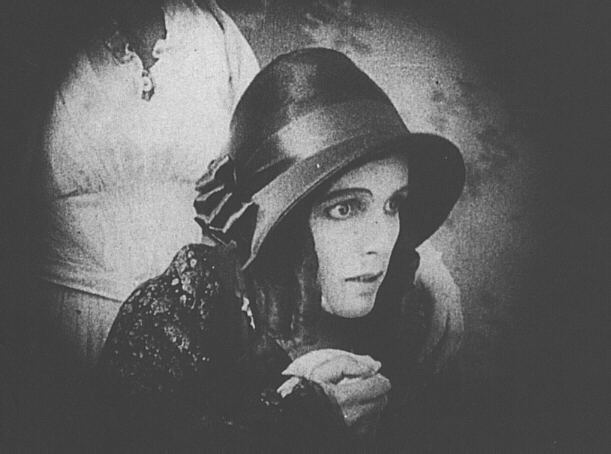
So, men get less pity.
Sure. If you gamble, sometimes you’re gonna lose. If there were no losers there would be no winners and the whole thing would be pointless. Plus, being able to fight off the bad guys is part of our job and we are equipped to do it. If the bad guy kills us, we failed. I suppose this is one reason a lot of the male victims in horror movies are strapping, confident young men. When they’re chopped up, we can just say, pwned!?
On the other hand, with, say, a nerdy, male character or a kind hearted priest, we might feel that they were thrust into a role that they weren’t cut out for. A character like that then, is more likely to survive for a long time and put up a heroic fight: more than we thought he was capable of. His demise might feel more tragic, but we’ll also be kind of proud of him and think, you put up a hell of a fight Sheldon, good for you?
The dead men are usually in the middle part of the film, so the more fun we’re supposed to have the more the victims will be bros and, for related reasons, bimbos. The bimbo killing phase of some films is probably where we can find misogyny. Another component of this is that we like to see such people taken down a peg, or impaled meat hooks. If we’re meant to be horrified the victims will be more sensitive types.
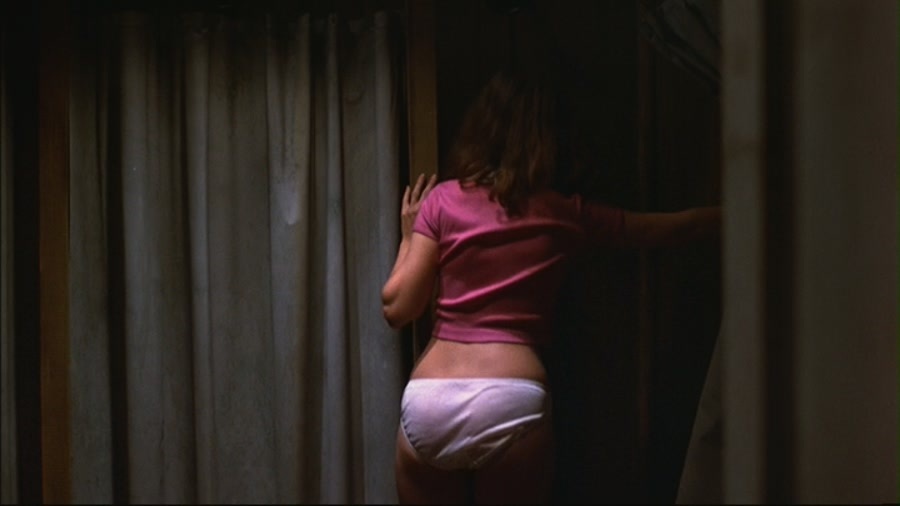
So, women are delicate little flowers, incapable of fending for themselves? Is that what you think?
Look, if anything, these movies tend to give the ladies the benefit of the doubt in these situations. At least if we’re talking about suburban women in rich countries, which is who we usually see in horror movies. I mean…
And in the movies, they’ve got teeny boppers defeating interdimensional beings who can kill you in your dreams, which seems pretty good to me. Obviously, you have the occasional Venus Williams or Lara Croft type, which even Plato recognized. But, for the most part women aren’t as good at fight or flight scenarios as men are. So even though Mike Tyson and your aunt Sally might really have about the same chance of fighting off Jason Vorhees, it’s not her job to do so and by targeting her, Jason is being a big bully.
Also, there’s something unfair about women being forced to fight like this. They already have to deal with all the shit covered in section one. This isn’t even their jurisdiction! It’s like Dante in Clerks, or for a more perfect corollary, Arnold in Junior.
This makes for increased dramatic tension because 1) we want the heroine to escape very much and 2) it seems very unlikely that she will be able to escape. So, by having a woman as the main victim/protagonist, the filmmakers get us to want the story to resolve with her escape even more than we otherwise would, and make it seem that much less likely that we’ll get what we want. Then the relief is that much sweeter when she fights off an invincible, hulking psychopath with a coat hanger.
Anything else to observe?
Well, it’s sort of interesting how the discussion of this subject parallels some of the reasons we tell the stories to ourselves. The films are effective partially because we are inclined to see women as victims and we want to see them rescued or defended, which the films deny us until the very end. So, we instinctively respond to this by acting as if the events of the film are real, and we describe the films themselves as victimizing women in general, and cast ourselves as the white knights by criticizing the stories.
Three: Women are vessels of experience, so the horror has a greater impact on them and therefore the audience.?
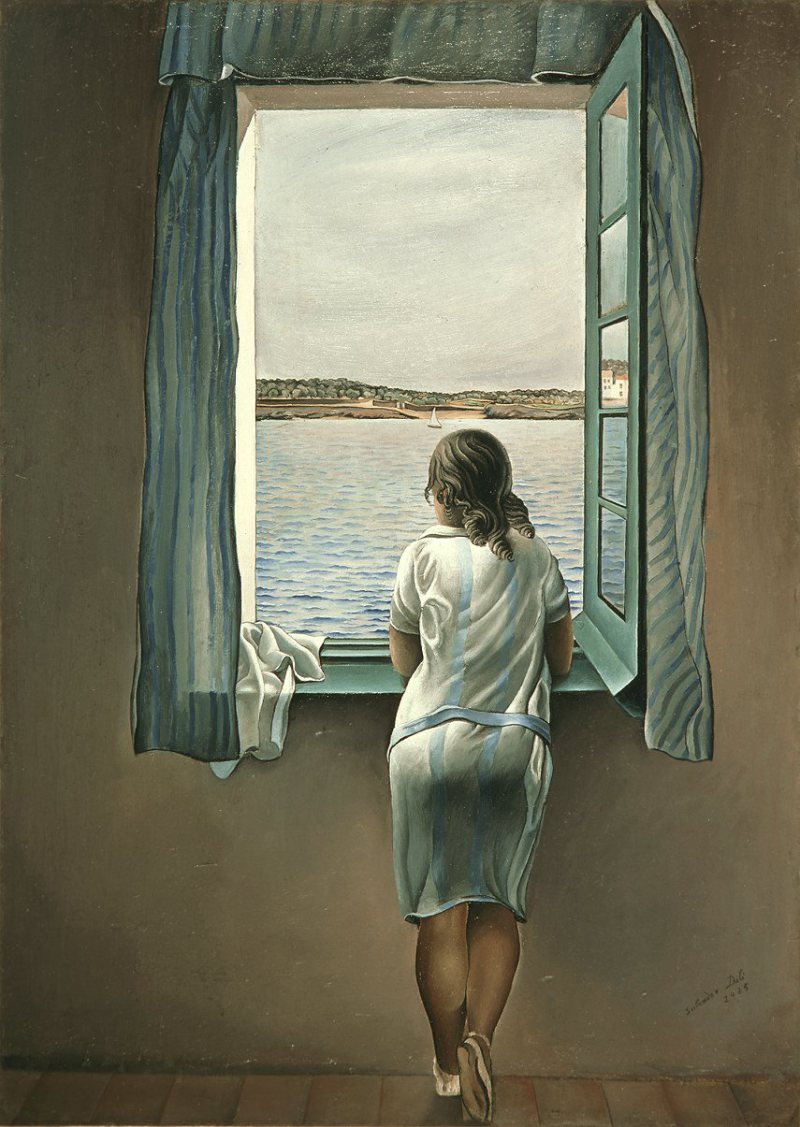
Objectification of women?
On the contrary. We think of women’s? experiences as more vivid, immediate and subjective. This is one reason we romanticize women in art. We sing vastly more songs about women. A song sounds better if it is about her sojourn to the big city than if it is about his. We imagine the little sweetheart drinking in the harsh, hard cityscape with her big eyes, and hope nobody takes advantage of her. The young man going to the big city has bitten something off and it’s up to him to chew it. We think of men as doing things and women as experiencing things.
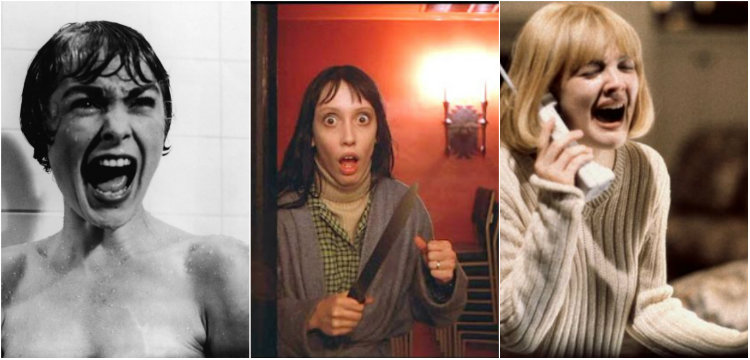
And how does this pertain to women in horror movies?
Women are more credulous and responsive, at least that’s how we see them. We see men as more detached. Women accept and react directly and immediately to their perceptions. So basically, they are more likely to believe in ghosts and monsters in the first place, then to be more afraid of them and to experience a deeper sense of terror when attacked by them. When the character has a stronger reaction, the viewer has a stronger reaction. Thus, the scream queen.

Men can be reactive too.
Yes, but in ways that are less useful to the horror film. We’re quicker to anger. When our ego is challenged, we have an irrational desire to beat down the challenger and prove we are superior. This can make for a good kill scene somewhere in the middle of the film, where a male character foolishly charges the monster with a baseball bat, lands a half dozen blows while the monster sits unaffected, then gets effortlessly chopped in half by a machete. That’s fine as a way of illustrating that it does no good to rage against the dying of the light. It’s a little piece of our overall hopelessness. But that’s no good for the overall thrust of the film, which is about our helplessness and fear in the face of the void.
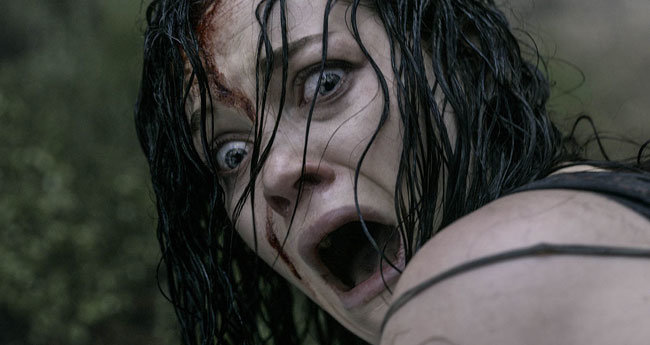
Shouldn’t Women be strong and independent, and shouldn’t all movies be didactic on this point at every opportunity?
Meh. If the filmmakers want to do that, they can. I don’t really think it’s a big deal if the woman is rescued or if she defeats the monster on her own. Courage in these films isn’t about outcomes, it’s about how you face the horror. If I may coin a phrase, the only thing we have to fear is fear in itself.
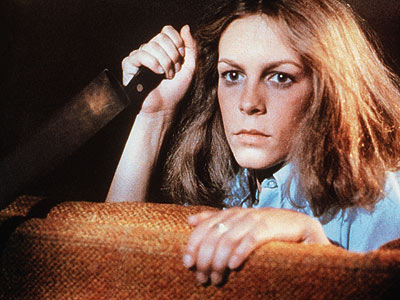
Uhhhhhhh….
Like, in one of the archetypes of this genre, Halloween, Jamie Lee Curtis is terrified and becomes a trembling mess. But she confronts fear and looks after the children she’s in charge of and makes the right decisions to increase her own chances. That is courage. I don’t think she’d be more courageous if John Carpenter decided the character should know Kung Fu. I don’t think it’s that big a deal that Donald Pleasance saves her at the end. While the resolution of these films is almost always a reestablishment of denial–you can escape death–I guess some of them can deal with confronting death bravely on the way to a temporary salvation.